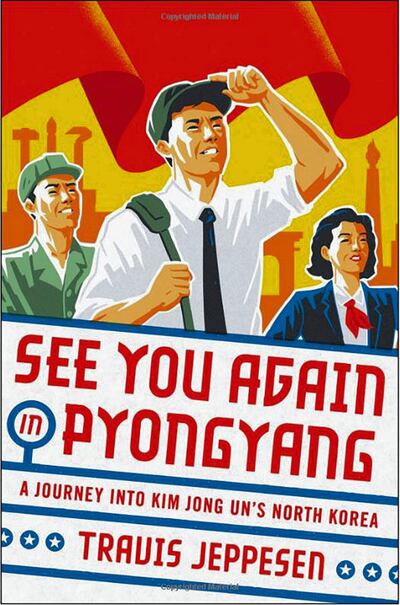Global interest in North Korea is prompted by fascination and fear. Both are overdone.
The fascination stems in part from stories of the bizarre aspects of the country and its leaders. North Korea is an unusual country, isolated but not entirely cut off from the rest of the world. That isolation breeds customs others find strange, and allows sufficient space for exaggeration. The fear comes as much from North Korea’s bellicose rhetoric as from its small nuclear arsenal. Its leaders represent a threat, but more to the North Korean people than their neighbours. Nonetheless, fear of North Korea is primarily self-interested. So too is fascination.
Travis Jeppsen, a novelist and the author of a See You Again in Pyongyang, travelogue and memoir of North Korea, is in the camp of the fascinated rather than the fearful. He sees himself as a true writer – a man of no allegiances. He desires to be a wandering observer, unconfined. But there are, as he notes, "No flaneurs allowed in Pyongyang". This stokes his curiosity.
When the author first visited North Korea in 2012, he did not expect to see so much colour and to be received so warmly. The resultant book attempts to communicate that humanity. But, like much outside writing on North Korea, it also serves a selfish function – as a literary investigation attempting to sustain the author’s faith in people.
Jeppsen is at pains to make it known that he was still aware of North Korea’s nuclear ambitions, its prison camps, its atrocities. He wishes to be credited for being clear-eyed. Is he taken in regardless? The author sees the humanity in North Koreans. But he attempts also to find the rationality in North Korean leaders, something that begins as an attempt to avoid writing about madmen and nuclear buttons. “I learned a lot of what I had been taught to believe about North Korea is false, exaggerated, or distorted,” Jeppsen writes.
His description of his journey is initially entertaining and illustrative. He arrives at an airport manned by young officials in immaculate uniforms and details the intrusive inspection of tourists’ electronic devices. A farcical scene unfolds as the author, with books and galore, is amusingly hassled at customs.
Upon arriving in Pyongyang, Jeppsen meets cheery guides, and finds hotels and karaoke bars full of foreigners engaged in dissipation – all staples of the Western journalism and film-making on North Korea about which Jeppsen is perfunctorily critical.
In art, he finds beauty in examples of the “much spat-upon Socialist Realist canon”, noticing “something compelling in the evocations of persistence, hope, and anger etched into the faces of the soldiers, workers, and peasants” who populate such scenes.
In Pyongyang, the author notices that public art abounds: the city is full of “colourful posters, murals, and mosaics – all made by hand, extolling the virtues of leader, party, country”.
Stripped of its ideological prescriptions, this art appears pleasant to the tourist, as does the life of an approved artist, who is at least liberated from working for profit. Jeppsen falls for this seductive vision, suggesting that the state-sanctioned artist’s life is “relatively charmed”. That such people are extensively indoctrinated and given monthly output quotas is mentioned, but offhand, as if these are merely aspects of the artist’s existence and not its governing principles.

When the tourists head to a water park, they spot a man in a bathing suit who is not doing any swimming. He appears to be a member of the state-security apparatus and is watching the bathers. Jeppsen makes this comic, but nonetheless unsettling.
As time progresses, Jeppsen begins to feel the paranoia which afflicts those visiting dictatorial states – and which is part of life for those whom live in such countries.
His emotions become more variable and less stable: "I find myself charmed to tears with the sweetness and earnestness of the people I encounter; the next second something will occur that reminds me how horrific it all is, the systematic oppression, the fear it breeds, the intellectual enslavement that leaves people bereft of any idea of how wrong it all is".
Jeppsen writes well about the different weight placed on truth in North Korea, particular to a state where lying – not only to friends and colleagues, but also to oneself – becomes not just advantageous, but necessary for survival.
The North Korean version of Maoist “struggle sessions”, in which comrades must subject themselves to ideological criticism, is part of this “domestic psychological warfare”.
At the close of his book, Jeppsen notes that history does not stand still. This is so true that his conclusion is out of date. Now the North Korean leader and the American president have met and smiled for the cameras. Gone is the prospect of conflict which Jeppsen deplored.
If Jeppsen’s book is, in part, an attempt to see the humanity of North Koreans beyond tales of prison camps and tyranny, this is not reduced by recent events. But he fails to place the dictatorship’s real horrors in the foreground in service of a defence of North Korea which has been rendered unnecessary by time.
Jeppsen adorns his prose in ways which do not always fit with the subject at hand. He has some success describing landscapes and his own emotional responses to cities and sights, art and culture. But his style falls flat when attached to Jeppsen’s less sparkling view of international politics.
Instead, the book succeeds as an idiosyncratic travelogue, a product of the author’s fascination.
____________________
Read more:
[ Arab satirist Karl reMarks: 'I feel free to write and talk about anything in the Middle East' ]
[ Discovering Abu Dhabi’s only second-hand bookshop ]
[ Book review: 'Just a Shot Away' looks back on the 1969 Rolling Stones tragedy at Altamont ]
____________________






